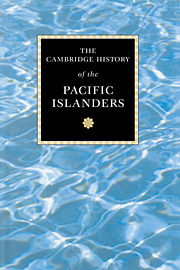54 results
A TRADING NETWORK AND ITS SOUTH AFRICAN NODE - Networks of Empire: Forced Migration in the Dutch East India Company. By Kerry Ward. Cambridge: Cambridge University Press, 2009. Pp. xv+340. £45, hardback (ISBN 978-0-521-88586-7).
-
- Journal:
- The Journal of African History / Volume 50 / Issue 3 / November 2009
- Published online by Cambridge University Press:
- 12 January 2010, pp. 457-458
- Print publication:
- November 2009
-
- Article
- Export citation
Abbreviations
-
- Book:
- The Cambridge History of the Pacific Islanders
- Published online:
- 28 March 2008
- Print publication:
- 28 August 1997, pp 471-471
-
- Chapter
- Export citation
2 - Human Settlement
- from Part One - The Pacific To 1941
-
-
- Book:
- The Cambridge History of the Pacific Islanders
- Published online:
- 28 March 2008
- Print publication:
- 28 August 1997, pp 37-79
-
- Chapter
- Export citation
Part One - The Pacific To 1941
-
- Book:
- The Cambridge History of the Pacific Islanders
- Published online:
- 28 March 2008
- Print publication:
- 28 August 1997, pp -
-
- Chapter
- Export citation
7 - New Economic Orders: Land, Labour and Dependency
- from Part One - The Pacific To 1941
-
-
- Book:
- The Cambridge History of the Pacific Islanders
- Published online:
- 28 March 2008
- Print publication:
- 28 August 1997, pp 218-252
-
- Chapter
- Export citation
Glossary
-
- Book:
- The Cambridge History of the Pacific Islanders
- Published online:
- 28 March 2008
- Print publication:
- 28 August 1997, pp 468-470
-
- Chapter
- Export citation
Map
-
- Book:
- The Cambridge History of the Pacific Islanders
- Published online:
- 28 March 2008
- Print publication:
- 28 August 1997, pp -
-
- Chapter
- Export citation
3 - Pacific Edens? Myths and Realities of Primitive Affluence
- from Part One - The Pacific To 1941
-
-
- Book:
- The Cambridge History of the Pacific Islanders
- Published online:
- 28 March 2008
- Print publication:
- 28 August 1997, pp 80-118
-
- Chapter
- Export citation
Map 17: Maximum expansion of Japanese control
-
- Book:
- The Cambridge History of the Pacific Islanders
- Published online:
- 28 March 2008
- Print publication:
- 28 August 1997, pp -
-
- Chapter
- Export citation

The Cambridge History of the Pacific Islanders
-
- Published online:
- 28 March 2008
- Print publication:
- 28 August 1997
5 - Land, Labour and Independent Development
- from Part One - The Pacific To 1941
-
-
- Book:
- The Cambridge History of the Pacific Islanders
- Published online:
- 28 March 2008
- Print publication:
- 28 August 1997, pp 152-184
-
- Chapter
- Export citation
Bibliography
-
- Book:
- The Cambridge History of the Pacific Islanders
- Published online:
- 28 March 2008
- Print publication:
- 28 August 1997, pp 471-493
-
- Chapter
- Export citation
Part Two - The Pacific Since 1941
-
- Book:
- The Cambridge History of the Pacific Islanders
- Published online:
- 28 March 2008
- Print publication:
- 28 August 1997, pp -
-
- Chapter
- Export citation
Frontmatter
-
- Book:
- The Cambridge History of the Pacific Islanders
- Published online:
- 28 March 2008
- Print publication:
- 28 August 1997, pp i-xviii
-
- Chapter
- Export citation
List of Contributors
-
- Book:
- Multicultural Japan
- Published online:
- 05 November 2011
- Print publication:
- 13 September 1996, pp vi-vii
-
- Chapter
- Export citation
Part 4 - The Japanese Family
-
- Book:
- Multicultural Japan
- Published online:
- 05 November 2011
- Print publication:
- 13 September 1996, pp 211-212
-
- Chapter
- Export citation
Index
-
- Book:
- Multicultural Japan
- Published online:
- 05 November 2011
- Print publication:
- 13 September 1996, pp 293-302
-
- Chapter
- Export citation
Part 2 - Centre and Periphery
-
- Book:
- Multicultural Japan
- Published online:
- 05 November 2011
- Print publication:
- 13 September 1996, pp 79-80
-
- Chapter
- Export citation
Frontmatter
-
- Book:
- Multicultural Japan
- Published online:
- 05 November 2011
- Print publication:
- 13 September 1996, pp i-ii
-
- Chapter
- Export citation
Part 5 - Culture and Ideology
-
- Book:
- Multicultural Japan
- Published online:
- 05 November 2011
- Print publication:
- 13 September 1996, pp 233-234
-
- Chapter
- Export citation



